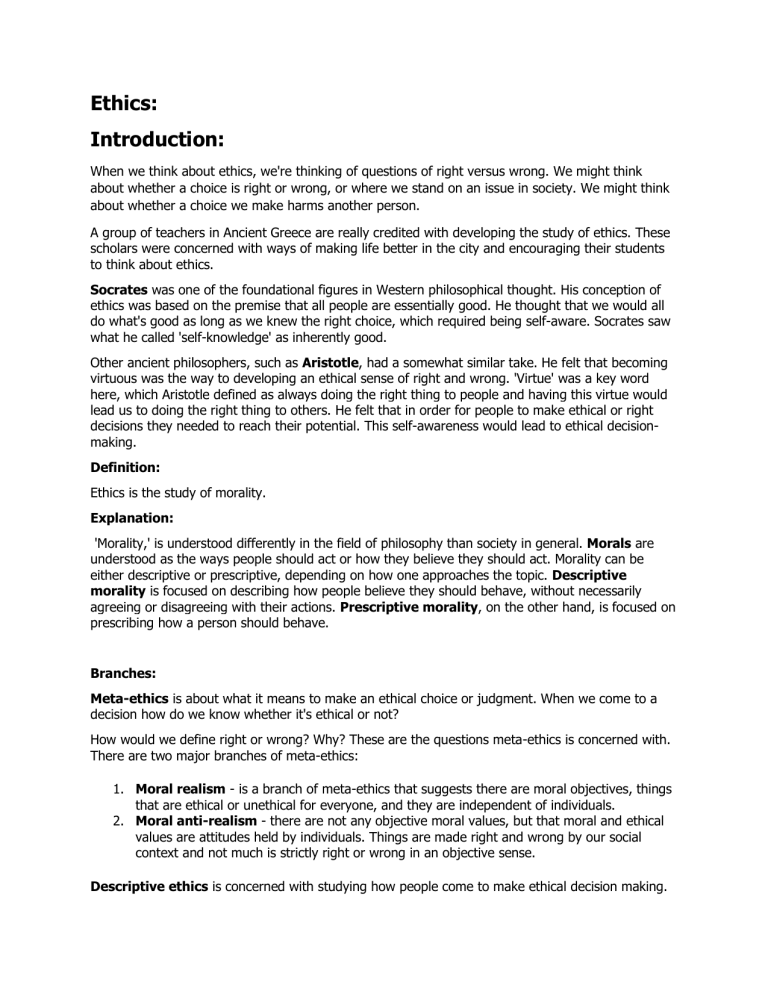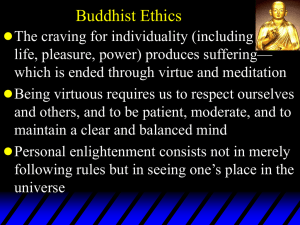
Ethics: Introduction: When we think about ethics, we're thinking of questions of right versus wrong. We might think about whether a choice is right or wrong, or where we stand on an issue in society. We might think about whether a choice we make harms another person. A group of teachers in Ancient Greece are really credited with developing the study of ethics. These scholars were concerned with ways of making life better in the city and encouraging their students to think about ethics. Socrates was one of the foundational figures in Western philosophical thought. His conception of ethics was based on the premise that all people are essentially good. He thought that we would all do what's good as long as we knew the right choice, which required being self-aware. Socrates saw what he called 'self-knowledge' as inherently good. Other ancient philosophers, such as Aristotle, had a somewhat similar take. He felt that becoming virtuous was the way to developing an ethical sense of right and wrong. 'Virtue' was a key word here, which Aristotle defined as always doing the right thing to people and having this virtue would lead us to doing the right thing to others. He felt that in order for people to make ethical or right decisions they needed to reach their potential. This self-awareness would lead to ethical decisionmaking. Definition: Ethics is the study of morality. Explanation: 'Morality,' is understood differently in the field of philosophy than society in general. Morals are understood as the ways people should act or how they believe they should act. Morality can be either descriptive or prescriptive, depending on how one approaches the topic. Descriptive morality is focused on describing how people believe they should behave, without necessarily agreeing or disagreeing with their actions. Prescriptive morality, on the other hand, is focused on prescribing how a person should behave. Branches: Meta-ethics is about what it means to make an ethical choice or judgment. When we come to a decision how do we know whether it's ethical or not? How would we define right or wrong? Why? These are the questions meta-ethics is concerned with. There are two major branches of meta-ethics: 1. Moral realism - is a branch of meta-ethics that suggests there are moral objectives, things that are ethical or unethical for everyone, and they are independent of individuals. 2. Moral anti-realism - there are not any objective moral values, but that moral and ethical values are attitudes held by individuals. Things are made right and wrong by our social context and not much is strictly right or wrong in an objective sense. Descriptive ethics is concerned with studying how people come to make ethical decision making. Applied ethics deals with the real world and how people actually make decisions about specific issues and then apply this decision-making. It's differs from other branches of ethics because it deals with very specific ways of thinking about ethical questions. For example, choosing to consider whether corporations should protect the environment, even if it means cutting into profits, and then analyzing a company's policy. Or someone's voting record on issues like abortion is an example of applied ethics. This branch deals with the pressing issues that we face in society and how people apply their ethical decision making to the real world. Bioethics: Introduction: The term 'bioethics' was first coined by a man named Fritz Jahr back in 1926. Scientific research was really taking off but after the atrocities of World War I, people were starting to rethink their ideas of progress. Yes, medicine and scientific research could be advanced, but how far are we willing to go? This issue became prominent again in the 1970s and '80s when computer technology opened up even more possible fields of scientific research. Although bioethicists do not always agree on exactly how wide their focus should be, in general, this field is concerned with the application of scientific and medical research on living organisms. There are many complex issues here, but at its most basic, the ethical debate comes down to two opinions. First is that scientists and researchers have a moral responsibility to respect life in all living things. This is an important issue when dealing with things like animal testing. The other side is that researchers have a moral obligation to do whatever it takes to advance the healthcare of humans. In other words, because we have the tools to help humanity, we have a moral obligation to do so and that's more important than the lives of a few rats. And the issues just get more complex from there. Cloning, gene therapy, genetic engineering, DNA manipulation - these are all possible through science and technology, but are they moral? The question of weighing costs and benefits remains, as does the basic question of whether or not humanity is meant to control such basic processes of life. Definition: Ethics applied to scientific advances in biology and medicine is called Bioethics Explanation: These are the basic issues in bioethics but at the end of the day, the focus is generally on preserving human life. After all, the end goal of biological, and especially medicinal research, is usually trying to help protect humanity. The most mainstream viewpoints are those that combine moral aspects from both of these arguments to encourage research that serves humanity but is still respectful of all living organisms, with the understanding that some sacrifices must be made. One of the other main issues in bioethics is the moral treatment of human test subjects. Human subjects can only be used under strict moral guidelines, and generally, the research must comply with the six cardinal values of autonomy, beneficence, justice, non-maleficence, human dignity, and sanctity of life. With these moral guidelines, your research can be moral. Otherwise, you're just a mad scientist. Autonomy is the respect of a person's individual rational sense of self. Beneficence is focusing an action on the well-being of others. Justice implies fair treatment. Non-maleficence is the restraint from doing harm. Dignity is a respect of a person's self-worth. And finally, there's sanctity of life, the belief that human life must always be held as sacred.




